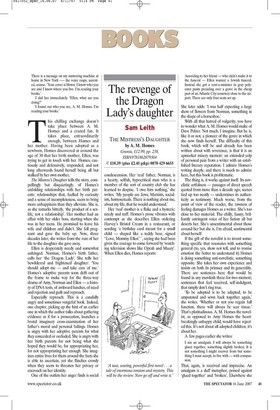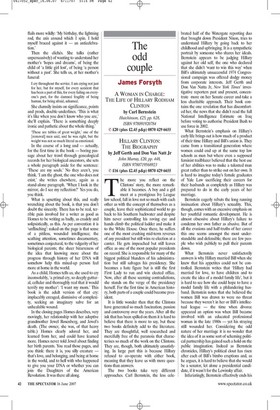The revenge of the Dragon Lady's daughter
Sam Leith THE MISTRESS'S DAUGHTER by A. M. Homes Granta, £12.99, pp. 238, ISBN9781862079304 © £1039 (plus £2.45 p&p) 0870 429 6655 This chilling exchange doesn't take place between A. M. Homes and a crazed fan. It takes place, extraordinarily enough, between Homes and her mother. Having been adopted as a newborn, Homes discovered at around the age of 30 that her birth mother, Ellen, was trying to get in touch with her. Homes, cautiously and defensively, responded, and not long afterwards found herself being all but stalked by her own mother.
The Mistress's Daughter tells the story, compellingly but disquietingly, of Homes's unfolding relationships with her birth parents: relationships that, fuelled by curiosity and a sense of incompleteness, seem to bring more unhappiness than they alleviate. She is, as she remarks bitterly, `the product of a sexlife, not a relationship'. Her mother had an affair with her older boss, starting when she was in her teens. He promised to leave his wife and children and didn't. She fell pregnant and gave the baby up. Now, three decades later, she writes from the ruin of her life to the daughter she gave away.
Ellen is desperately needy and somewhat unhinged. Norman, Homes's birth father, calls her `the Dragon Lady'. She tells her bewildered and frightened daughter: 'You should adopt me — and take care of me.' Homes's adoptive parents soon drift out of the frame to make way for the three-way drama of Amy, Norman and Ellen — a history of DNA tests, of awkward lunches, of need and rejection and guilt and reproach.
Especially reproach. This is a candidly angry and sometimes vengeful book. Indeed, one chapter, picking up the hint of an earlier one in which the author talks about gathering evidence as if for a prosecution, launches a brutal imaginary cross-examination of her father's moral and personal failings. Homes is angry with her adoptive parents for what they concealed or occluded. She is angry with her birth parents for not being what she hoped they would be, for appropriating her, for not appropriating her enough. She imagines entire lives for them around the facts she is able to ascertain, yet she flinches crossly when they seem to threaten her privacy or encroach on her identity.
One of the outlets her anger finds is social condescension. Her 'real' father, Norman, is a hearty, selfish, hypocritical man who is a member of the sort of country club she has learned to despise. 'I owe him nothing,' she writes. 'My people are Jews, Marxists, socialists, homosexuals. There is nothing about me, about my life, that he would understand.'
Her 'real' mother is a flake and a hysteric: needy and naff. Homes's prose vibrates with contempt as she describes Ellen ordering Harvey's Bristol Cream in a restaurant, or sending 'a birthday card meant for a small child — shaped like a teddy bear, signed "Love, Mommy Ellen" ', saying she had been given the courage to come forward by 'watching television shows like Oprah and Maury'. When Ellen dies, Homes reports: According to her friend — who didn't make it to the funeral — Ellen wanted a Jewish funeral. Instead she got a rent-a-minister in gray polyester pants presiding over a grave in the cheap part of an Atlantic City cemetery close to the airport. There are only four seats set up.
She later adds: 'I was half expecting a large show of flowers from Norman, something in the shape of a horseshoe.'
With all that hatred of vulgarity, you have to wonder what A. M. Homes would make of Dave Pelzer. Not much, I imagine But he is, like it or not, a pioneer of the genre in which she now finds herself. The difficulty of this book, which will be and already has been written about with reverence, is that it is an upmarket misery memoir: an extended yelp of personal pain from a writer with an established literary reputation. I admire Homes's writing deeply, and there is much to admire here, but this book is problematic.
The thing is, it works against itself. Its novelistic artfulness — passages of direct speech quoted from more than a decade ago; scenes tied up too neatly — undermines its authenticity as testimony. Much worse, from the point of view of the reader, the rawness of feeling damages Homes as a writer. She's too close to her material. The chilly, funny, brilliantly astringent voice of her fiction all but deserts her. She's unsentimental about those around her but she is, I'm afraid, sentimental about herself.
If the gift of the novelist is to invent something specific that resonates with something general (to, yes, show not tell, and to ironise emotion the better to understand it) Homes is doing something anti-novelistic, something opposite. She takes her own experience and insists on both its primacy and its generality. There are sentences here that would be found in any mawkish three-for-two memoir; sentences that feel received, self-indulgent, that simply don't ring true.
'To be adopted is to be adapted, to be amputated and sewn back together again,' she writes. 'Whether or not you regain full function, there will always be scar tissue.' That's platitudinous. A. M. Homes the novelist, as opposed to Amy Homes the heartbreakingly unhappy child, would have rejected this. It's not about all adopted children, it's about her.
A few pages earlier she writes: I am an amalgam. I will always be something glued together, something slightly broken. It is not something I might recover from but something I must accept, to live with — with compassion.
That, again, is received and imprecise. An amalgam is a duff metaphor, poised against 'glued together' and 'broken'. Elsewhere she flails more wildly: 'My birthday, the lightning rod, the axis around which I spin. I hold myself braced against it — an anticelebration.'
Then the clichés. She talks (rather unpersuasively) of wanting to understand her mother's 'hopes and dreams', of being the child of 'a little girl lost', of being 'a person without a past'. She tells us, at her mother's funeral: I cry throughout the service. I am crying not just for her, but for myself, for every accident that has been a part of this, for every failing on everyone's part, for the damned fragility of being human, for being afraid, ashamed.
She clumsily insists on significance, points and prods, double-underlines. 'This is what it's like when you don't know who you are,' she'll explain. 'There is something deeply ironic and pathetic about the whole thing.'
'These are tables of great weight,' one of the [removal] men said, and he was right, but the weight was not so much literal as emotional.
In the course of a long and — actually, for the first time in the book — boring passage about her trawl through genealogical records for her biological ancestors, she sets a whole paragraph aside for the sentence: 'These are my souls.' No they aren't, you think. 'I am the ghost, the one who does not exist,' she writes elsewhere, again as a stand-alone paragraph. 'When I look in the mirror, do I see my reflection?' Yes you do, you think.
What is upsetting about this, and really wrenching about the book, is that you don't doubt the sincerity. There has to be real, terrible pain involved for a writer as good as Homes to be writing as badly, as crudely and solipsistically, as this. As per convention it is 'unflinching': naked on the page is that sense of a pitiless, wounded intelligence; the scathing attention, sometimes documentary, sometimes conjectural, to the vulgarity of her biological parents; the sheer bizarreness of the idea that knowing more about the progress through history of her DNA will somehow help this mixed-up person feel more at home in the world.
As a child, Homes tells us, she used to cry inconsolably, 'a primal cry, so deeply guttural, cellular and thoroughly real that it would terrify my mother': 'I want my mom.' This book is the adult version of that cry: implacably enraged, dismissive of complexity, seeking an imaginary salve for an unhealable wound.
In the closing pages Homes describes, very movingly, her relationship with her adoptive grandmother Jewel Rosenberg, and Jewel's death. (The owner, she was, of that heavy table.) Homes clearly adored her, and learned from her, and could have learned more. Homes never told Jewel about finding her birth parents. You read those pages, and you think: there it is, you silly creature — that's love, and belonging, and being at home in the world, and to hell with who happened to give you your DNA or whether you can join the Daughters of the American Revolution. It was there all along.





















































 Previous page
Previous page